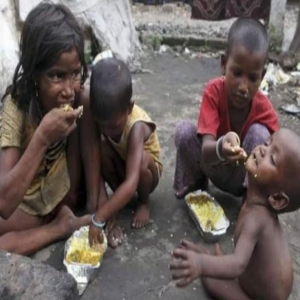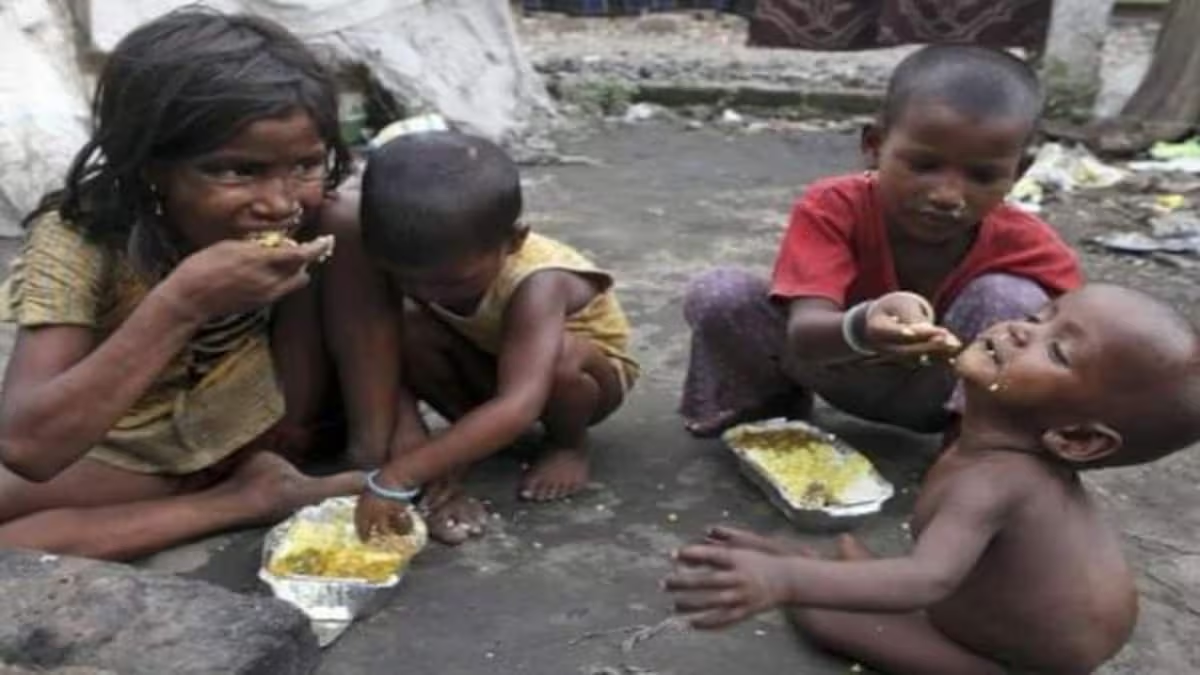
.jpg) Prakash Louis
Prakash Louis

Forty per cent of child food poverty is reported in India, which is much higher than the global average of 27%. India is the second highest in child food poverty in South Asia. Child Food Poverty results from failing governance systems and administrative failures, not failing families as the upper echelon wants to project. This hard data is revealed by the UNICEF Child Nutrition Report, 2024. The Report goes on to present a grim picture of India. The prevalence of anaemia among pregnant women between the age group of 15-49 is 52.2%. Among the children between the age group of 6 to 59 months is 67.1%. That means more than half of the children's population is anaemic.
UNICEF Report states that the following would be health implications: stunted growth, weakened immune system, etc. Cognitive impairment and higher school dropout would be educational impacts. The economic impact would be productivity loss and increased healthcare costs since anaemic children need greater healthcare. The social impact would be increased vulnerability of the child and family, social stigma and discrimination by others. If that child ends up being a girl child in the given patriarchal system, it would be better for that child to die than live since it would have to face exclusion at every stage.
The Report clearly and categorically points to the reasons for food poverty among India's vast population of children. These include global food and nutrition crises, conflicts, climate shocks, etc. Above all, the Indian government's policies and programs, its paradigm of development, and its priorities are squarely responsible for the deplorable condition of India's children. While over 70% of the Indian population is struggling to make ends meet, some businessmen of India, especially from Gujarat, have been credited as the world's wealthiest men. In 2022, Adani briefly became the world's second wealthiest man. That year, India Today anointed him its newsmaker of the year, calling him the "growth king." Interestingly, Adani took over from Ambani to be the doyen of Indian corporate.
Salit Tripathi, writing in the First Post on February 26, 2023, observed that the Adani Group has grown remarkably during Modi's time in power. While Modi was chief minister of Gujarat, Adani invested in several plum projects in the state, including India's largest private port in Mundra, Gujarat. By early 2019, Adani controlled one-quarter of India's port capacity and had won the rights to manage 6 government-owned airports. Thus, Adani grew from strength to strength to become the richest businessman in India and also to be counted globally.
It is pertinent to note that when Modi became prime minister in 2014, India changed the rules to allow a company with no prior experience to bid for airports, and Adani made the best of that change. When Modi's government introduced the infamous market-oriented agricultural reforms, Adani invested in grain silos. The manner and method in which land was acquired for this purpose is another story of crony capitalism.
The First Post highlighted a few more areas to demonstrate the evolution of Adani-Ambani capitalism in India.
There are no confirmed direct business ties between Modi and Adani. But both are close to each other. In 2014, when Modi left Gujarat for New Delhi to be sworn in as prime minister, he flew on Adani's private plane. It is also reported that Adani has travelled with the prime minister on a few overseas trips. When Adani's son married in Goa in 2013, Modi reportedly attended the ceremony for two full days. The opposition parties allege that the Indian government has pressured its neighbours, including Sri Lanka and Bangladesh, to give favourable energy deals to the Adani Group.
What type of capitalism are Adani and Ambani promoting in India with patronage from Modi? A careful reading of the political economy of India of the last decade points to the fact as Modi is propagating to remake India, he is also seeking to remake Indian capitalism. One clear result of his years in power is the shifting position of the business owner in society. Instead of a respectable trustee who can help guide the state's administration, the businessperson has become an often fearsome ally happy to do politicians' bidding and secure contracts by cultivating the right contacts. This shift will lead to a plutocratic society, far removed from the public-spirited capitalism its founding father, Mahatma Gandhi, championed. India now seems further from those ideals than ever before. It is even further removed from Dr Ambekdar's ideals enshrined in the Constitution, such as liberty, equality, and fraternity.
Analysing the mercurial rise to the global business company of the Ambanis, journalists Paranjoy Guha Thakurta, Subir Ghosh, and Jyotirmoy Chaudhuri published a book titled 'Gas Wars: Crony Capitalism and the Ambanis'. The book claims that the political system of India has created crony capitalism. It further argued that in sectors like infrastructure and energy, a few firms are getting project deals in exchange for political contributions. According to the book, the CAG report states that the government prepared contracts favouring RIL, and the Prime Minister changed Petroleum Ministers to favour the firm.
Documents accessed by The Reporters' Collective (TRC), a non-profit media organisation based in India, reveal that Al Jazeera media reported on March 1, 2023, that the Indian government granted an extraordinary favour to controversial tycoon Gautam Adani, boosting his coal business. The government did not explain why the Adani Group was given an exception.
The evil consequences of coal extraction are as follows: 1) The Tribals lose their land once and for all; 2) Their primary sources of life – jal, jungle, zameen – are lost to them forever; 3) With this, their connectivity with their ancestors is lost; 4) They are forced to move out to slums in the towns. On the other hand, Adani and all those who are party to the contract earn huge profits.
In a country where around 70% of the children are affected by food poverty, the presence of billionaires is a slap to the face of democracy. Though the country claims to be governed by democratic and socialist principles, it is curtailed by 'the survival of the fastest, fittest and smartest.' In this crony capitalism, cricket players are paid Rs 7 crores per year.
On July 4, when the cricket team was given a reception, 7 roads of Mumbai - NS Road (North Bound), NS Road (South Bound), Veer Nariman Road (North Bound), Dinshaw Vacha Road, Madam Cama Road, Barrister Rajni Patel Marg and Vinay K Shah Marg - were closed by the traffic police authorities. Lakhs of people gathered for this event. But when a protest march was organised in support of the victims of Manipur violence, there were not even 100 people. In Marxian terms, 'Cricket has become the opium of the Indian middle class.'
During the lockdown imposed on the pretext of COVID-19 by the Prime Minister in Mumbai, thousands of migrant labourers were stranded without preparations or provisions. When they tried to take a bus or train to go back to their homes, they were brutally lathi-charged.
Prasenjit Chowdhury unravels the stark reality of this crony capitalism. For the rest of Indians, the poor and the unwashed, the aspiring and the middle class, the Adanis and Ambanis are the stuff of fairy tales, destined to grow richer and richer and amass fabulous wealth. They are the new sultans of corporate India, priests-in-chief of a god of riches able to turn dust into billions. The rub is that the rise of a few billionaires is linked to a very stark wealth inequality in India.
According to a recent report by Oxfam – 'Survival of The Richest' – released at the World Economic Forum in Davos in January, India's top 1% owned more than 40.5% of its total wealth in 2021; and in 2022, the number of billionaires in the country increased to 166, from 102 in 2020. The richest have amassed a considerable part of the wealth not due to their sheer ability and hard work but through crony capitalism, enabled by their proximity to those in government. Meanwhile, the poor in India "are unable to afford even basic necessities to survive", still struggling to earn a minimum wage and access quality education and healthcare, languishing under chronic under-investment by that same government. Surely, something is rotten in 'Vishwa guru' India.
Socialism, in common parlance, is a political idea based on the belief that all people are equal and that money and property should be equally divided. Socialists believe that sharing ownership of the means of production equally among society would increase people's quality of life. They want to give people free access to basic life necessities like food, housing, and healthcare. Some socialists also believe employment should be guaranteed as a human right.
Stated in another way, social equality in this context means the absence of discrimination based on caste, class, colour, creed, sex, religion, or language. The framers of the Indian Constitution envisaged a democratic socialism, the Indian brand of socialism that aims to provide social welfare, reduce income inequality, and give more autonomy to local communities. It advocates for a mixed economy, where the state and private sector coexist and work together to improve society. But in the last decade, Modi has opened the Indian economy to corporates and withdrawn from the responsibilities of the state.
Historical data reveals that Mahatma Gandhi and other leaders in India's freedom movement clearly identified himself as a socialist. They envisaged a political economy which would rise above corruption, casteism, patriarchy, cronyism, nepotism and divestment based on patronage and profit. Gandhi dreamt of an egalitarian society which would further the cause of democracy, Swaraj. He was against the idea of enormous fortunes in the hands of few. The rich and entitled should be trustees of the society and use their resources for the welfare of the downtrodden.
Trusteeship provides a means of transforming the present capitalist order of society into an egalitarian one. It gives no importance to capitalism but gives the present producer/owner class the chance of reforming itself. It proposed fixing a decent minimum living wage, and the limit of this minimum wage should be fixed according to the maximum income allowed to any person in society. The difference between such minimum and maximum incomes should be reasonable and equitable and should vary from time to time so that the tendency would be towards eradication of such differences.
Such a socialism could be called 'Sarvahara Socialism'. It is the Dalits, the Tribals, the backward castes and the minorities who are the Sarvahara of India since they are dispossessed by the socio-economic and political powers of this country. Adanis and Ambanis are building empires of pillage and plunder. Hence, they think that they are the Sarvesarva, the mighty, the powerful, the rich. They are into business to loot and plunder by any means. Against this capitalism, Sarvahara Socialism means providing all people with food security, full employment, and universal access to education, health, and housing. It means the economic, political and social empowerment of the people by vastly improving the living conditions of workers, peasants and the hitherto marginalised sections.
The Sarvahara of India continues to draw inspiration from Shaheed Bhagat Singh. "The struggle of India would continue so long as a handful of exploiters go on exploiting the labour of the common people for their own ends. It matters little whether these exploiters are purely British capitalists or British and Indians in alliance, or even purely Indians."